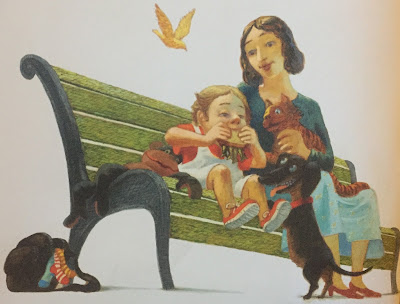On Monday, I featured the newest book by these 2 religious leaders. Today’s book is a creative retelling of 3 jewels of The New Testament. Sometimes called The Lost Parables, this book considers a different emphasis from the concept of loss. Additionally, the 3 stories are beautifully rendered in a modern context.
Picture Book:
Who Counts? 100 Sheep, 10 Coins, and 2
Sons
Authors: Amy-Jill
Levine & Sandy Eisenberg Sasso
Illustrator: Margaux Meganck
Summary: As
in Luke, there are 3 separate stories. The first is of a modern sheep farmer. He counts his sheep often. One day he discovers one sheep is missing. He searches and searches. The sheep is glad to be found and returned to the flock! The farmer is so relieved, he throws a party!
The next story has a woman with 10 prized coins. She enjoys counting them. One day she is shocked to realize that a coin is missing. She searches and sweeps. Finally the missing coin is found! At the party she throws to celebrate, she explains "Just one coin matters. Without it, something is missing. Now my coin collection is complete." The Prodigal Son story begins as expected. A youngest son spends his inheritance in a faraway place. When the money is gone, he must get work with a farmer feeding pigs. After he realizes the pigs are eating better than he is, he decides to go home, confess his mistake, and offer to work hard for his father. Despite his shabby appearance, the father happily runs to greet the son. The loving father gives the son new clothes, new shoes, and even a new ring. With great joy, the father invites his neighbors to come celebrate,
but "when the father counted everyone who had come to the party, he realized that one person was missing." After recognizing his neglect, the father runs out to explain his joy to his older son and urges his son to join them. The older son complains that his devotion hasn't led to a party. The father confesses: "I have two sons - one, two. I paid attention to my younger son, but I discounted my older son. I didn't realize that he felt lost."
In all of 3 stories, the emphasis is on all being together - a complete set, in the last story - all together as a complete family. Hanna’s Comments: My favorite aspect of this book is its focus on completeness. In the 3rd story, the one "who counts" is the older son who is missing from the party. Certainly the idea of loss is here, but completion is primary. I suggest you tie this to God's desires for shalom. Shalom is more than peace. It's wholeness. As in Monday's book, the Note to Parents and Teachers at the end is very valuable. It explains how these parables have been misinterpreted and their new focus on completeness. You'll also find a great list of questions.
Original Publisher & Date: Westminster John Knox Press, 2017
Age & Grade Appropriateness: 3 and up, Pre and up
Formats other than Book: None at present
Scripture Connections: The 3 “Lost Parables” of Jesus are found in Luke 15. The Parable of the Lost Sheep is also found at Matthew 1:12-14.
Idea(s) for Application: Read this book in 1 session or 3, depending on your audience’s attention span, in order to explore the meaning behind these stories of Jesus. Emphasize the theme that everyone counts, everyone makes a difference, unless all are present, there is not wholeness.




















































